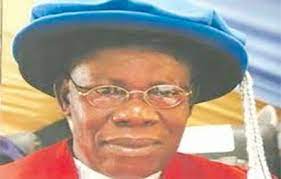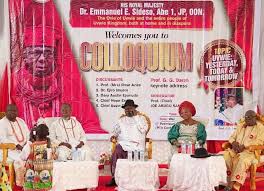
Professor G.G. Darah, the erudite professor of Oral Literature, Folklore and Cultural Sciences has said that the most significant changes that will transform Nigeria’s federating units such as Uvwie and Urhobo is political restructuring of Nigeria.
In a keynote address at a colloquium at the PTI Conference Centre, Effurun on “Uvwie: Yesterday, Today and Tomorrow” to mark the 15th coronation adversary of the Ovie of Uvwie Kingdom, HRM Emmanuel Ekemejewa Sideso, Abe 1, JP. OON, Professor Darah regretted like other oil-rich districts of Urhobo and the Niger Delta, Uvwie has been reduced to an economic colony of Nigeria.
“For over 50 years the people of Uvwie have offered a conducive atmosphere for businesses and investors to thrive and prosper. The Federal Government of Nigeria and multinational oil companies are the biggest beneficiaries of the prosperity.

“Regrettably, the people of Uvwie have become landless and impoverished. Like other oil-rich districts of Urhobo and the Niger Delta, Uvwie has been reduced to an economic colony of Nigeria. This situation of exploitation should not be allowed to continue. The instruments for a fairer and more equitable engagement should be fashioned to enable Uvwie people to become substantial shareholders in the businesses and industries. Therefore, fresh memoranda of understanding should be prepared to equip Uvwie people to own controlling shares in the existing and future enterprises.
“In the light of emerging consensus on public economic ventures, giant industries like the Refinery, Petrochemicals Plant, and the Nigerian Gas Company are likely to be available for privatization. Urhobo/Uvwie investors must be allocated substantial shares in the privatized enterprises
“For equity and justice, the policies on local content must be implemented in all the public industries and institutions such that the relevant cadres of personnel must be reserved for Uvwie/Urhobo host communities. For example, about 75% of employment of middle level and non-technical cadre should be reserved for locals. The tertiary institutions – PTI and FUPRE – must allocate agreed admission spaces for Uvwie citizens.
“Having lost much of the land to industries and government institutions, Uvwie people can no longer practise subsistence agriculture. Yet they have their natural right to enjoy sustainable and decent livelihoods. The Uvwie people should now design a development master plan to consolidate the status of an industrial society in which they can thrive and prosper. An Uvwie Investment and Development Corporation (UIDC) should be registered to work out the strategies of how Uvwie/Urhobo
people can become self-reliant and dominant in certain fields of enterprise. The UIDC will engage governments and financing institutions such as the Bank of Industries, African Development Bank and international agencies that fund economic projects. In order to generate capital to finance enterprise, it is necessary to establish an Uvwie Bank for Commerce and Industry. The shares can open to other Urhobo kingdoms, friends and associates of Uvwie.
” Many of the goods sold in Uvwie and Urhobo markets are produced in other states. This condition of dependency should be challenged. Deliberate plans should be made to identify consumable goods and services that must be manufactured in Uvwie/Urhobo land to stimulate economic growth, employment opportunities, and wealth. For example, there could be “Effurun soaps and detergents”, ‘Ekpan packaged garri and starch’, ‘Ugbomro Gins and Beverages”’ ‘Ugborikoko Vegetable Oils’, etc.
In the viable field of catering services, enterprising Uvwie people can develop food brands such as “Ukodo Plaza”, “Amiedi Assembly”, “Oghwo-Evwri Palace” etc. The patronage of these delicacies will further promote Urhobo cultural image. With the current pressure on land, space for industries and* factories can be obtained by negotiating with churches to offer sections of their premises.
“The churches will be co-owners and shareholders in the enterprises. Similarly, new housing policies should be developed in favour of high-rise structures of ten floors and above; this is the trend in all modern metropolis in the world.
In the next ten years and beyond, fossil fuels for automobiles might give way to electric vehicles. This development will lead to the shutdown of many petrol service stations. Their premises will be useful for industries, factories, and shopping plazas. The problem of congested inter-city motorways will be reduced with the introduction of metro line mass transit systems. That is when Effurun/Warri and environs will assume the status of a metropolis.
In the next decade or so, an international wing of the Osubi Airport will be built; this will upgrade the area to an aeropolis, that is, a city dependent on aviation economy.
Professor Darah said the restructuring of the Nigerian Federation would entail the devolution of political, economic, and security powers to the\ federating units or states.
“The federating units or states will have 100% ownership/ control over their natural and other resources. The states will pay a negotiated tax to the central government to run essential public services. In the restructuring project, each state will have its own constitution. In the constitution of each state, the principles of restructuring will also be entrenched. Each local government or kingdom will enjoy the right of 100% ownership and control of its natural resources and revenues and pay a negotiated tax to the state government. Thus, restructuring will end the totalitarian and exploitative control of the federal government over the federating units; in the same manner, restructuring will put an end to the autocratic and exploitative power of states over local councils. Uvwie and other resource-endowed areas will benefit from the restructuring of the Nigerian federation. These democratisation processes will create a more equitable and just federation. Richly endowed municipalities like Uvwie/Effurun will have funds to engage in large-scale industrial enterprises, manufacturing, education, cultural preservation, security, housing, health, and other social services.
In a paper presented by Mr. Daro Ejumudo which dealt extensively on the origin of the Uvwie people, he celebrated Abe I and described him as a symbol of change and positive transformation is Uvwie kingdom.
“His reign has ushered in greater peace and innovations. A world class palace, befitting the Uvwie people was built during his reign. Like the Roman god, Janus, he continues to look in opposite directions, drawing inspiration from the Uvwie past to promote a glorious future.
“The throne under him has remained a force of cohesion, binding together the fissiparous tendencies and social groups that inhere in every robust society, evenone as homogenous as the Uvwie kingdom. He radiates the grandeur and dignity of the kingdom and a source of inspiration and unity for the kingdom. Endowed with wisdom courage and integrity, he is the embodiment of the culture and
tradition of the people.
“But like the theme of this colloquium: “Uvwie: Yesterday, Today and Tomorrow”, the Ovie is also clearly focused on the future, promoting education at all levels to give opportunity to the underprivileged. There is no one more prepared and equipped to lead the Uvwie people to a brighter future.
In his paper, the Wado City advocate, Dr. Ejiro Imuere warned on the long time implication of calling Urhoblo towns, Warri and that it would lead to diminishing the Urhobo nation with the largest population in Delta state.
Prof. Rose Aziza lamented the marginalization of women in most Urhobo communities and the need for a review. Chief Assin Godstime lamented the low representation of some Urhobo communities including Uvwie in the political equilibrium in Delta state while Chief Hope Erute in a paper commended the late Ovie of Uvwie Kingdom, Eruowho 11 and reigning monarch for their contribution to modern Uvwie emancipation. The moderator of the event was Prof. (Chief) Joe Abugu(SAN) a specialist in Company Securities and Secured Credit Transactions. He has consulted in several capacities in public issues and private.
Earlier in an opening speak, the Ovie of Uvwie Kingdom, HRM, Dr. Emmanuel Sideso narrated his desired to have a concise history of the Uvwie people and that the colloquium was just a stepping stone to achieve his aim.
The colloquium committee chairman, Chief Omafume Amurun announced that details of the colloquium is expected to be published as a compendium for further study on the history of the Uvwie people.




GIPHY App Key not set. Please check settings